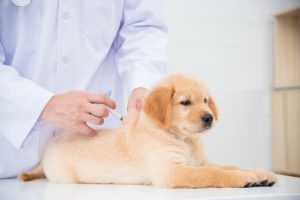817-599-6000
824 S Bowie Dr
Weatherford, TX 76086
817-599-6000
824 S Bowie Dr
Weatherford, TX 76086

How Vaccines Work How Vaccines Work Vaccinations prevent disease by stimulating your pet’s immune system to produce antibodies that protect them from disease-causing viruses and bacteria. Each time a vaccination is repeated it reminds the immune system to produce protective antibodies. After the initial series, most vaccinations are repeated annually to continue to remind the immune system to protect your pet. You must plan ahead to protect your pet. It takes time for your pet’s immune system to build the number of antibodies that are needed to protect them. Having your pet vaccinated the same day as they are boarded or having surgery leaves them without protection while they are in a situation where they could be exposed to the disease. Most vaccines take at least 10 days to provide protection.
A small number of pets may have an allergic reaction from a vaccination, which are usually not serious. Symptoms may include lethargy, soreness or swelling at the injection site, or in more severe cases, hives or facial swelling. Most of these symptoms can be controlled with Benadryl should they occur. If your pet has any of these symptoms please report the reaction to our office.
Dogs should have the following vaccinations:
Cats should have the following vaccinations:
Pets need to receive an initial series of vaccinations with periodic boosters to develop and maintain immunity. Our staff will assist you in determining the appropriate vaccination schedule for your pet, which is determined by individual lifestyle, age, and level of exposure. Unvaccinated adult pets generally require boosters 3-4 weeks after the initial vaccine set. High risk situations may require supplemental doses of the Parvo or Bordetella vaccines.
© Copyright 2026 Bowie Dr Animal Hospital, Inc, All Rights Reserved. | Website Design by WABW Media Group